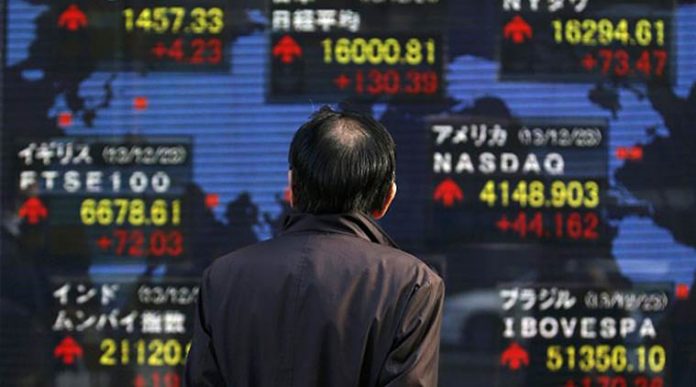Tokyo: Asian stocks were mostly steady on Wednesday after Wall Street again rose to record highs, although movements were limited as a wait-and-see mood prevailed before the Federal Reserve reveals its monetary policy stance later in the day.
Spread betters expected Britain’s FTSE to start unchanged and Germany’s DAX and France’s CAC to each open down about 0.1 percent.
The caution in financial markets ahead of the Fed has kept some investors from making sharper adjustments to their positions despite potentially higher tensions over the Korean peninsula following hawkish statements from U.S. President Donald Trump overnight.
The Fed is due to announce its decision at 1800 GMT on Wednesday and is widely expected to keep rates unchanged after a two-day meeting but could begin paring its bond holdings, with reductions likely to start in coming months.
The financial markets will also sift through the “dot plot” representing Fed policymakers’ rate projections for any hints of a rate hike in December.
MSCI’s broadest index of Asia-Pacific shares outside Japan was up 0.05 percent.
Japan’s Nikkei was effectively flat. Shanghai added 0.3 percent while Hong Kong’s Hang Seng added 0.2 percent.
The three major U.S. stock indexes edged higher on Tuesday, logging record closes, with financial stocks providing the biggest boost.
The Canadian central bank hiked interest rates this month and left the door open for more tightening, while a BoE policy-maker hinted last week that it might need to raise rates in the coming months.
Expectations for the Fed to raise interest rates in December have risen since.
According to CME FedWatch, markets are pricing in a more than 50 percent chance of a Fed hike in December, up from around 31 percent as recently as Sept. 8.
The dollar hovered close to an eight-week high against the yen, buoyed with U.S. Treasury yields having risen to one-month highs before the Fed’s policy announcement.
The greenback was little changed at 111.460 yen after touching 111.880 overnight; it’s highest since late July.
Currency markets had a muted reaction to Trump’s latest comments on North Korea.
Trump said in a speech to the U.N. General Assembly on Tuesday that the United States will be forced to “totally destroy” North Korea unless Pyongyang backs down from its nuclear challenge.
South Korea’s KOSPI was down 0.05 percent and the won was up 0.2 percent at 1,128.6 to the dollar.
The euro edged up to touch $1.2019, its highest since Sept. 11.
The dollar index against a basket of six major currencies was little changed at 91.747.
The Mexican peso pulled back slightly after dropping in response to a strong earthquake that struck central Mexico. The currency stood at 17.8165 pesos per dollar after touching 17.8500 overnight, its weakest in two weeks.
The 10-year Treasury note yield US10YT=RR stood close to 2.246 percent, the one-month peak set the previous day.
In commodities, oil prices rose after Iraq’s oil minister said OPEC and other crude producers were considering extending or even deepening a supply cut to curb a global glut, while a report showed a smaller-than-expected increase in U.S. inventories.
Brent crude futures were up 0.3 percent at $55.30 a barrel and U.S. crude rose 0.6 percent to $49.76 a barrel.
























